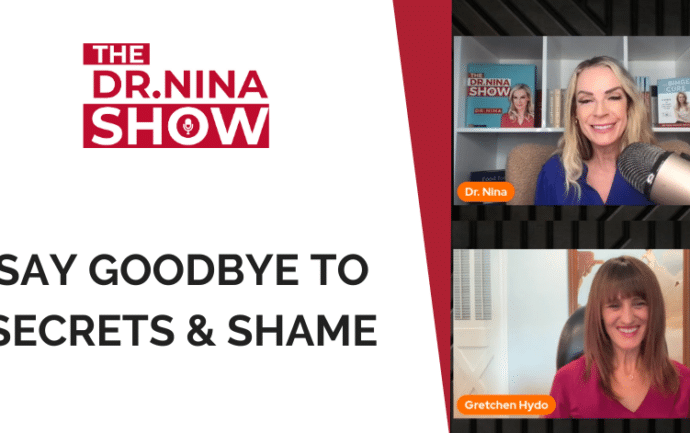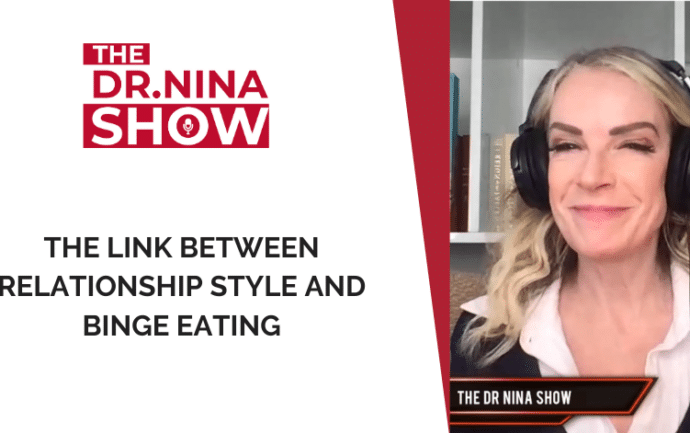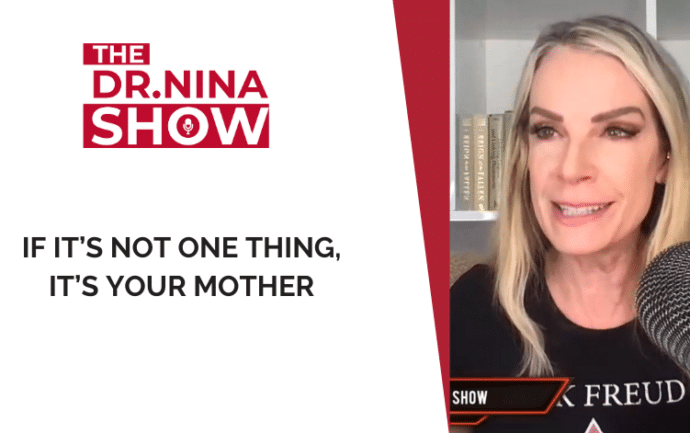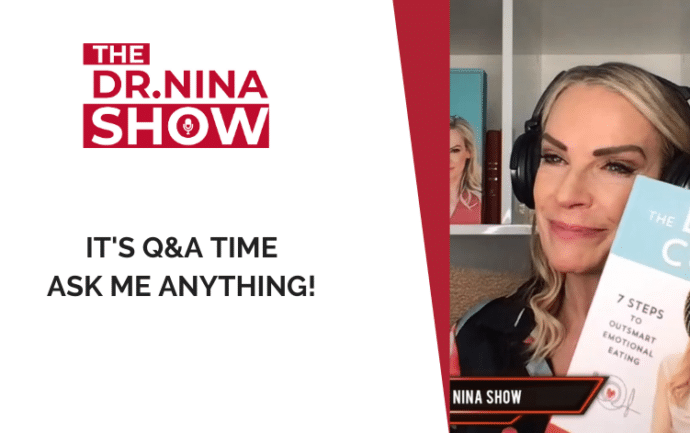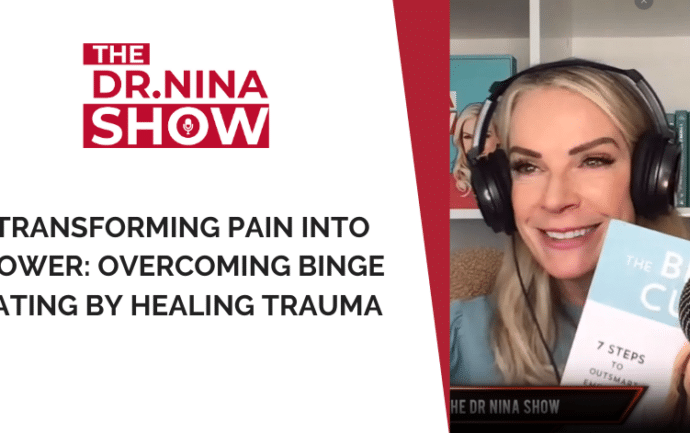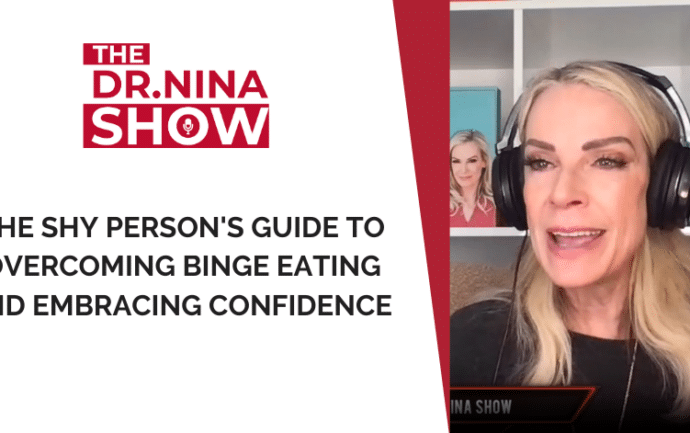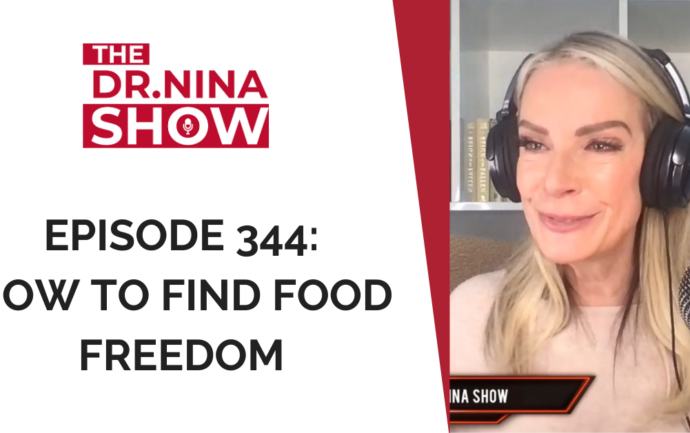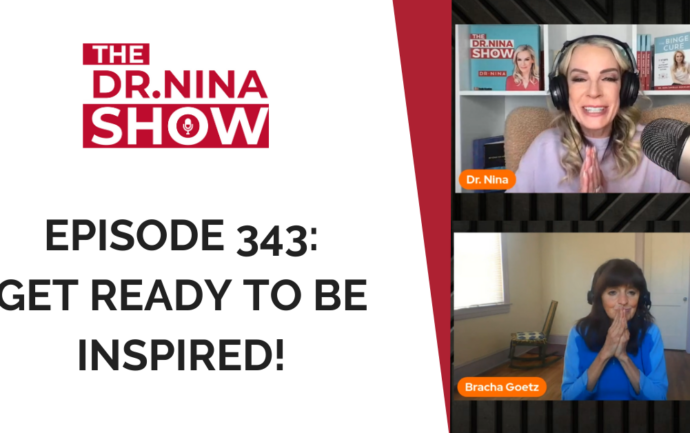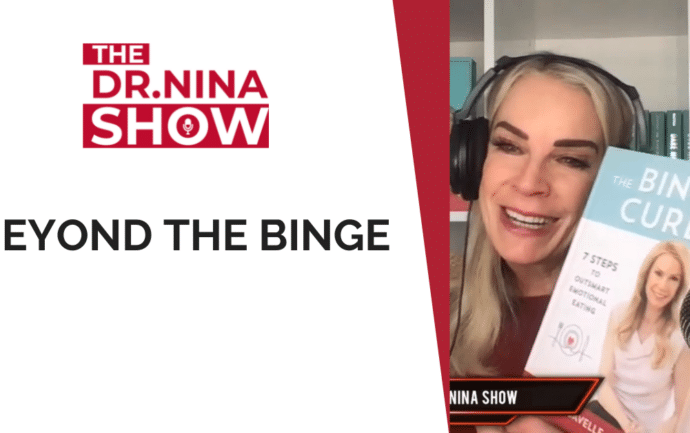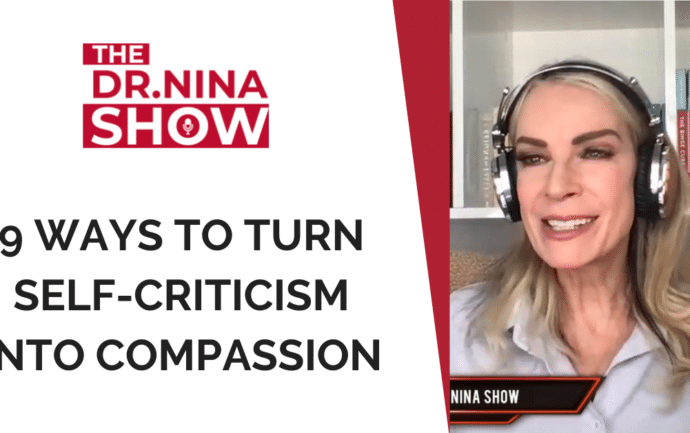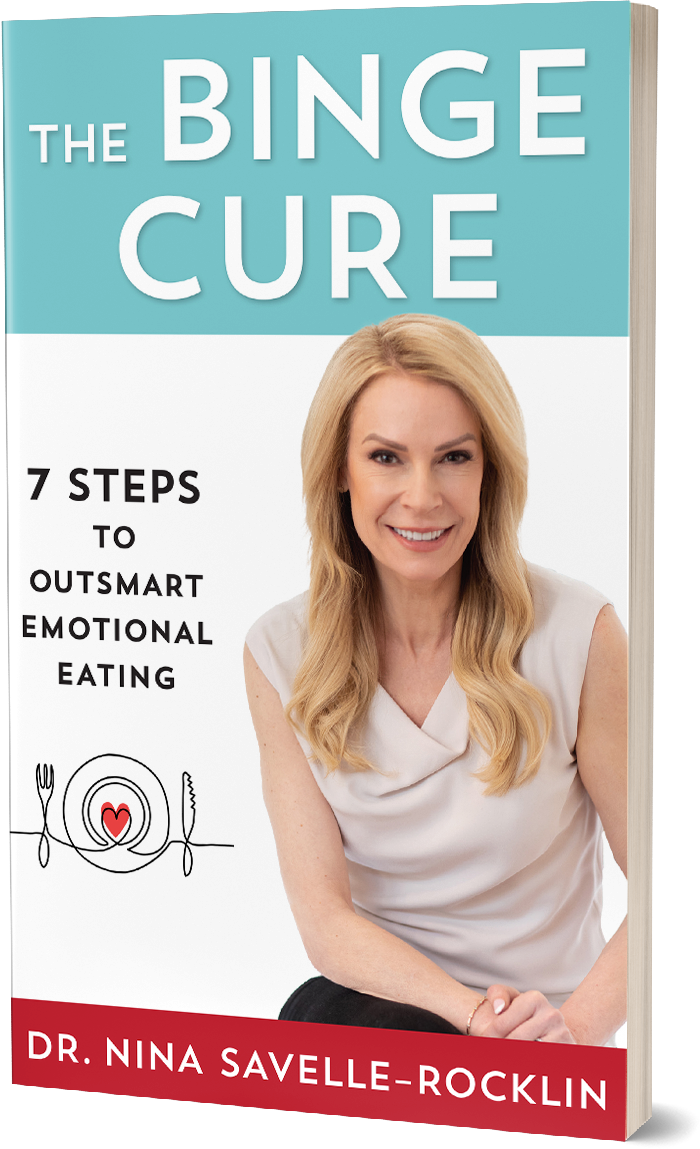Dr. Nina Savelle-Rocklin
Your Anti-Binge Plan Starts Today [Podcast]
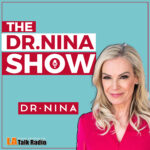
On today’s episode of The Dr. Nina Show on L.A. Talk Radio, September 21, 2022, I talk about:
⭐️Diets, Willpower & Control
⭐️The ‘Diet-Binge Cycle.’
⭐️How to Crack the binge code
⭐️Recovery or Liberation
⭐️How do you get rid of binge eating?
I also explain why those urges to binge need your attention and what to do about it, and explore the connection between “me time” and nighttime bingeing. Be sure to check out this valuable episode and get started on a path to your binge-free, happy life.
Transcript
You're listening to the Dr. Phil Show with Dr. Nina Savelle-Rocklin. Only on La talk radio.
Dr. Nina:
Hi there. Welcome to Dr. Nina's show. I am your host, Dr. Nina Savelle-Rocklin. I'm a psychoanalyst specializing in eating disorders, and I am here to help you break free from binging guilt, body shame, and diets that don't work. I want you to wake up and think about your day, not your diet. If you would like to call in with questions, the number here is 323-203-0815. I'm also live streaming on Instagram. So, if you are with me on Instagram and you have a question, or comment, feel free to just comment below.
I would love to hear what is on your mind. What is eating you, because the real problem with binge eating, stress eating and, any kind of emotional eating is not what you are eating. It is not what you are eating, it is what is eating at you. It is not what you weigh. It is what is weighing on you.
So, give me a call. And let's find a way to banish binging for good because I'm here to help you figure out why? And figure out ways to address those underlying reasons.
Anti-Binge Plan
Dr. Nina:
So today, let's talk about the anti-binge plan. Your anti-binge plan starts today, I'm going to talk about dieting, willpower, and control. Maybe even food addiction, what the diet binge cycle is and what to do about it, and how to crack the binge code. What about recovery? I have some thoughts on that. And we're going to talk about how to get rid of binge eating for good. So, you know, I will never forget how hopeless Kara felt when she first consulted me about her terrible relationship with food. She said, oh, Dr. Nina, you have treated so many people successfully, but I don't think I will be one of your success stories. She told me, I know I'll be dealing with this the rest of my life.
She had been dieting and binging since she was about 10 years old. She was she'd been doing it for decades. And she thought that she would have to struggle with food for the rest of her life. A few months later, she said, this made me so happy. It's gonna make me cry when I talk about it. She said thank you for existing and for helping me get free from binging.
Dr. Nina:
Like Kara, do you also think you can never overcome binge eating? Do you think this is something you're going to have to struggle with forever? Well, most people do believe that binging is a forever thing or the struggle not to binge. It's a forever thing. Why? Because a lot of us associate binging with having a food problem or a food addiction, which is why it seems impossible to create change. After all, we can stop certain addictive behaviors, we can stop smoking, we can stop drinking, and stop gambling, we can stop certain things that we do to cope, but we can't stop eating. And those beliefs are the belief that you will always have to struggle with food, the belief that you are a food addict the belief that you have no willpower or no control. Those are correct beliefs and transformation is possible.
Evolution
Dr. Nina:
I like to talk about evolution. We evolve. And once we've evolved, that's where we are like the caterpillar who is never going to go back and be in that cocoon. As the butterfly is never going to be a caterpillar cocoon. Once you're out of the cocoon. You're a butterfly and you fly free. And that is the kind of transformation that happens when you change your relationship with yourself which changes your relationship with food for good. So, if you want to experience the kind of freedom and liberation because I like to call it liberation, that Kara and so many other people have experienced keep listening.
Dr. Nina:
So many people try to control binge eating by keeping tabs on their food intake someone in my group program just said, oh, well, I was really good because I didn't binge. No, this is not a good thing. That's not how we're going to think about being good. We're not putting a morality, to not binging. How about waking up and not wanting to binge? How about going through your day and not thinking about food? How about just food is something you look forward to because it is one of the pleasures of life. And it's breakfast, lunch, dinner, and snacks, sometimes a dessert, and it's yummy. But it's not something that is your best friend, and your worst enemy. So, we usually adopt restrictive diets, we forbid ourselves from going to our favorite foods, and we talk ourselves out of eating for long periods. We call it fasting, we call it being on a plan a food plan, aka dieting. And some people think hey, no food, no binging.
Diet Binge Cycle
Dr. Nina:
Diets work as long as we stay on them. But no diet is sustainable forever. So, in other words, diets don't work. The experience of deprivation makes us want what we can't have or what we think we can't have. After a few days a week, a month or more, it is hard to maintain that level of restriction and deprivation and we eat something on our bad food list and that leads to binging. The cycle of blame and shame and self-hatred starts all over again. And then the next thing you know, you're going back on the diet, rinse and repeat. This is called the diet binge cycle. And I am here to assure you that you are not a failure at dieting diets have failed your diets focus only on what you are eating, and not why.
Binging is not about willpower; it is not about control. And you know what it is not even really about food. Binging is a way of coping with difficult, painful, or upsetting situations, thoughts, and emotions, it is a solution to the problem. Even though it sure feels like the problem. You may use food for comfort for distraction celebration to fill an empty place inside your soul to express anger to you know, for so many different reasons. To convert emotional pain to physical and it's not like you're like oh, let me convert emotional pain to physical like, let me make that plan. No, it's unconscious. It's out of your awareness. It is hidden from you these motivations, but it's what you're doing. And once you realize why, then you can find a different way to respond to your emotions. So again, it is not what you are eating. That is the true problem. It is what's eating at you. And that is why it is so important to understand the why. Why are you heading for the kitchen? Why is DoorDash the first app that comes up on your phone? Let's crack the code to emotional eating. Let's crack the code binging.
Question: Are the real causes of binging being mainly psychological?
Dr. Nina:
Here's the thing. We are not triggered by food. It feels like you're triggered by food. I get that. Back in the days when I was the poster child for eating disorders. I sure felt like I was triggered by food. I was not either, are you? The real causes of binging are mainly psychological? And they like deep within your emotions and your feelings within you with your thoughts. These feelings can relate to unpleasant experiences from childhood or trauma that you have never fully addressed. Or they may be located more in the present.
Dr. Nina:
Now, I just want to say one thing that's that I said that most binging is motivated by psychological reasons. Yes. If you don't eat enough during the day, you get so starving, that you can't stop eating once you start. That's a binge but that's because of deprivation. However, in binge eating disorder, which is using food to resolve things psychologically it's not deprivation, physiological deprivation that is the main reason for binging. It's something else. It's feelings and our culture. Our culture promotes the idea that feeling feelings make us weak. We are considered strong. If we push our feelings away, we are considered weak if we have them.
Question: When was the last time you felt the emotions and feelings?
Dr. Nina:
Let me ask you something. Consider the last time you cried or cried with someone you love. Or when was the last time you confronted someone about how much they hurt your feelings? Or when was the last time you got mad at someone or something? Or anxious? or afraid? nervous, scared? When was the last time you felt that? Because we're told not to feel those feelings, we're told to ignore them, to drop them to look on the bright side to practice gratitude. But you can't just drop your feelings. You can't ignore them. You can't positively think them away. You can't breathe them away. That's another one that I hear a lot. I'll just breathe. When I get upset, I'll just breathe out the feeling. No, you can't breathe out a feeling you breathe out co2 or whatever. I failed science. I have no idea what you breathe out. But it's not feelings, I can tell you that. We also can't step them down. Bingeing is a way of coping with our emotions. And they need your attention to those emotions, not your condemnation.
Question: How do you get rid of your emotions?
Dr. Nina:
So, I'm going to get to how you feel. How do you get rid of your emotions? A lot of people will say, well, I know I just have to sit in my feelings. Until they go away. Guess what? You can't sit your feelings out, stuff them away, starve them down, drop them, ignore them, positively think them away, or anything, the only thing you can do is feel them.
Identify the emotions.
Dr. Nina:
But how do you feel about them? If you've been told not to feel them? How do you feel your emotions when you're told that the very existence of those emotions is somehow wrong? I'm going to tell you how to feel your feelings. How to get rid of feelings as you feel them? How do you feel about them?
First, you identify them. And often we turn to foods so quickly. We don't even know we're triggered by an emotion. That's why I want you to use my food mood formula to identify what is the emotion or the need or the conflict within you that maybe you're not even aware of. And briefly, creamy foods are associated with a need for comfort, filling foods think pizza, pasta, cake, bread, anything burgers, anything that kind of takes up space within you. Those are filling foods and they're associated with symbolically filling a void. Think about the holes in your life. What are they? Are they you know, something missing? Or do you want to have a baby and it's hard to get pregnant? Has your last child just left? And you're an empty nester, are you in an unsatisfying relationship? Or do you have an unsatisfying job? What are the holes in your life? Look at those and find new ways to fill them. Crunchy, anything with a crunch? crackers, chips, even hard chocolate, crunchy cookies, and Oreos. Anything with a crunch is associated with forms of anger, frustration, annoyance, irritation, and rage, these are all forms of anger. So instead of getting mad at yourself for eating over what you weigh, how about you look at what is upsetting you and find a way to express how you feel instead of turning it on yourself? So how do you get rid of feelings?
Identify the feelings.
Dr. Nina:
Identify what you're feeling. What do you need? Are you sad? Do you need comfort? Are you upset? Do you need comfort? Are you lonely, empty? Is there a void in your life? Are you angry? Do you need more sweetness in your life? What's going on with you? Next is to express those emotions. And if you need some help, I have some help for you.
In my book, The binge cure On Page 45,46, and 47, I have these prompts. If you're watching, you can see these prompts. And these prompts are designed to help you express your feelings. So, you know, if we give anxiety, a voice, these prompts start kind of in a benign way, I'm concerned because finish the sentence, I'm uneasy. That is why I have misgivings. I'm worried, I'm alarmed, I'm distressed, I'm afraid I'm terrified. You finish the sentence.
Remove the feelings.
So, to get rid of feelings. First, you have to speak whatever the feeling is, I'm upset about this. I'm upset at, at the situation in my job, or in my family or with COVID or in the world, or oh my gosh, this is upsetting me, and very specifically, speak it, finish the sentences, speak them to someone, put them in a journal, the way to get rid of feelings is to first express them, and then respond to yourself. So, where a lot of people go wrong is they'll say, like, well, I realized that I was angry. And I didn't feel any better. What's the point of feeling angry? I hear this all the time. Okay, so I realized that I was angry is not feeling your feelings. It's identifying it. Feeling your feelings? Oh, I realize that I was really angry about the situation.
Express and respond to yourself.
Dr. Nina:
You know, in our political environment, I am really upset that there seems to be no justice, I'm aggravated that certain people are ignoring the needs of the country. I'm frustrated and pissed off and, and, and enraged that the country is going in this direction. Okay, so that's expressing it. The next step is responding to yourself. And this is where most people they're trying to help themselves, but they hurt themselves and dismiss themselves. They'll say something like, oh, but it could be worse. Oh, but I should just look on the bright side. Oh, but you know what? This is a first-world problem. You know what, I shouldn't be worried about this, like a lot of people are struggling with way worse issues. Or they'll say, what can I do? Like, what's the point of feeling anything won't change the situation? Okay, so all of that is dismissive. We don't feel our feelings and express our feelings so we change the situation. We, feel our feelings and express our feelings so that we change how we feel about the situation, for example, so morbid of an example. But so perfect.
Feel the feelings
Dr. Nina:
I'm going to share it with you when someone passes away. And we go through a grieving process. We don't grieve and mourn and deal with the sadness and the loss and all of that so that the person will come back to life, oh my God, I felt these feelings of the person is no longer dead. No, it doesn't work that way. We feel our feelings so that we come to terms with the loss. We don't feel as acutely in pain, about the loss that we feel better about the situation. Not that the situation changes. So that's the point of feeling feelings, it doesn't matter that nothing will change. That's not the point. And then the other well, it could be worse, I need to look on the bright side, I should be happy that at least this and it could have been worse than it could have this and so and so has it a lot worse than I do. Well, that's dismissive, because although that may be true, it could have been worse. It still happened to you. It may be true, that so and so is struggling with way worse situations that may be true, but you still are dealing with what you are dealing with. And that needs your attention. Not your dismissal.
Dr. Nina:
If you break your arm in a snowmobile accident, and someone else in the other snowmobile breaks both their legs are you supposed to say well, I shouldn't even be upset about my painful broken arm because at least it's not two broken legs. No, you'd say ouch. My arm hurts. I'm glad I didn't break my legs but oh my arm hurts. Same with emotional Pain, don't compare it.
Respond to the feelings and validate.
Dr. Nina:
So, where most people go wrong is they dismiss it. Here's what to do instead. Respond. And how do you respond, you need to vary your way of responding to yourself. I came up with an acronym because I love my acronyms. Vary stands for validate, acknowledge and reassure yourself. Validate this painful thing happened. And I'm upset about it. Someone on Instagram, you want to drop, something you're dealing with, and I can, I can go through very, with a specific example.
Dr. Nina:
If there's something that you are dealing with, that you feel upset about, and you feel comfortable with, drop it in the comment. And I will demonstrate very, by going over your situation, if not, I will just come up with one on my own. All right, I'm someone whose relationship didn't work out. And they're very sad. Of course, you're sad. You had high hopes for this relationship. You thought maybe this is a person that was going to be your person, and everything was going to be great. And it's very painful and upsetting that it didn't work out. So of course, you're sad.
Question: How to get rid of the feelings?
Dr. Nina:
How else could you feel given the fact that you had this breakup? It's very upsetting, it's very painful, it's very crushing. course you're sad, how else could you feel? And you are still, you know, out there, just because this relationship didn't work out doesn't mean you are not lovable, you are not likable, and you're out there, and you're going to go and continue to date and meet people. And, you know, you're going to find the right person for you eventually, in the meantime, yes, it hurts. But let's think about different ways that you can, you know, get out there and find someone new. Different ways that you can express your sadness, other than going to the ice cream, you got this. Rather than just, you know, drown your sorrows and ice cream, got to talk to yourself, how to talk to yourself differently. Because when you talk to yourself differently, and you are a friend to yourself, and your kind to yourself, you're going to feel good, you're going to feel better. And when you feel good, because you're nice to yourself, guess what, you're not going to use food for comfort, because you're already comforting yourself. So that's how you get rid of feelings, you identify them what's going on, we get so good at turning to food, we don't even know what's going on.
Dr. Nina:
The new way of responding to ourselves, we express our feelings and respond to ourselves. Practice makes progress. And if you have something that's going on in your life, and you want to talk about that and figure out a new way to address it so that you're not turning to food. Give me a call at 323-203-0815. All right.
Recovery and Liberation
Dr. Nina:
Now, here's the thing I hear a lot. I'm going to be in recovery. This is what Kara thought number Kara who I talked about in the beginning. She said, I'm going to be in recovery the rest of my life, I'm never going to recover. I'm always going to have to think about this. She wanted to be in recovery. And what I told her was, hey, I don't believe in recovery. No, I do not believe in recovery. I believe in liberation. So, recovery evokes, the image of recovering from something from substance abuse from drugs or alcohol. Being in recovery suggests a never-ending process of having to think about your food choices for the rest of your life.
Dr. Nina:
Recovery means you're always in recovery. I don't know about you, but that sounds terrible. Who wants to be in recovery? The rest of your life who wants to think about this stuff the rest of your life who wants to be thinking about your food choices and counting carbs and macros because carbs, fat grams, macros. I don't know if that sounds terrible, but you just want to live your life.
Dr. Nina:
I believe in liberation. Liberation means being set free from oppression which is the actual definition of liberation. Liberation means being set free from oppression, from the ideas and behaviors that make binge eating disorder feel like a prison, you can break free, and you can be liberated. It is possible to achieve liberation from soul-sucking diets and guilt and shame and binging and all of it to be done once and for all.
Dr. Nina:
And when I think about, you know, the results that I have experienced. There's a reason why I became a psychoanalyst and a coach, it is to be able to help other people break free from binging because I was the poster child for eating disorders. I know what it is like to struggle. I know what it is like to think that food is the problem. And I know what it is like to be on the other side and realize, oh, food was never the problem. Food was the solution to the problem. The problem was my relationship with myself, and my feelings for the world people. The problem was anxiety and fear and lack of self-confidence and self-hatred and all those things. Those were the problems. And when you resolve those problems, you are liberated and you don't use binging to cope. And it is possible for anyone to be liberated from binge eating. I don't care how long you have struggled. I treat many people who are in their 60s and 70s, who have struggled for 50-60 years and they're getting themselves liberated. So, there is hope. To achieve liberation, it is important to recognize that binge eating is about feelings, not about food.
Dr. Nina:
When we validate, acknowledge, and reassure ourselves, we stop using food for comfort when we express those feelings and respond to ourselves. So, the next time you find yourself going in the kitchen, or heading to the store, or heading to the drive-thru or just having that like Bingi feeling like oh my god, I got to do this now. Ask yourself, what are you hungry for? What are you feeling? What are you craving? What's your hungry heart saying to you? Ask yourself, Am I mad, or sad? Afraid, upset, lonely, tired? By the way, that's another reason people sometimes use food is to keep themselves awake, to enliven themselves. They don't give themselves what they need. They're tired and they eat sugary foods to stay awake. Which is also not the proper response to what you need. If you are tired, you need rest.
Dr. Nina:
Most of the time binging is facilitated by something internal, some conflict, some emotion something going on that is easier for you to turn on yourself for binging focus on your weight focus on that you binge than it is to think about other problematic situations, or needs or wishes or hopes or fears or anxieties in your life. We get so adept at turning to food, we don't even realize we're triggered by the true emotions and needs and conflicts and all the rest of it. Stay hidden from us. We have no clue what's going on inside. We just know that we've got to eat something now. And that's why again because it's so hidden. That's why I created the food mood formula to help you take it out of hiding. Like identify what's going on and figure out okay, how else can I respond to this? Look, if your friend is upset? Do you say oh you're upset? Listen, I know just what to do. Let's get some cookies. Let's order pizza. No. At least I hope not. You talk to your friend, your friend to your friend. Be a friend to yourself.
Dismiss the urge to binge.
Dr. Nina:
Beverly is saying some coaches talk about dismissing the urge to dismiss, not understanding Beverly. Some coaches talk about dismissing the urge and your thoughts. Okay, well, here's the thing. I want you to know this I am a coach but I am also a psychoanalyst, which means I have a doctorate in psychology. And I am a certified psychoanalyst, which means that I have the most clinical experience of any type of therapist the most clinical experience and the deepest understanding of the mind. And so, if some coach is telling you to dismiss your thoughts, don't listen to that coach, because your thoughts lead to feelings leading to the behavior. If you only focus on the behavior, you're going to be in recovery for the rest of your life. Because you are going to be thinking about what you are eating, and what you don't want to eat or what you shouldn't eat and what you ought to eat and all the things always and not realizing that your behavior with food is a result of feelings which come from thoughts, thoughts, lead to feelings lead to behavior. If you dismiss the urge to binge, how do you dismiss the urge to binge? Oh, I have the urge to binge forget, forget it. Like if that worked, and you could dismiss it? How the hell would you do that? You don't dismiss the urge to binge you understand the urge to binge? Why do I have this urge to binge? What's going on with me what problem is binging solving? Ask yourself why? What problem is this solving? What is this doing for me? What is this distracting me from you can't dismiss an urge to binge? It's strong because it is a coping mechanism. That's like saying, dismiss your urge to cope. I tell people I am not here to take your binge eating disorder away from them. I'm here to help you get to the point where you give it up yourself. That's the point. If you have the urge to binge, it is for a reason something is going on. And you need to be curious about that reason. What's this doing for me? Oh, I want to I want to binge on ice cream. Hmm, that means I need comfort. How else can I comfort myself? I guess I'm feeling sad. What would I say? Yeah, you know, what some coaches say is the urge is simply neurological junk. And therefore, you just have to recognize that and form a new habit are not given in to the urge. Yeah, that doesn't work. Because it's not neurological junk. It's coming from your mind. And if you could just dismiss it and form a new habit or not get into it. That's called willpower. And I want you to break free of willpower. I want you to be able to say, hey, I have the urge to binge because something is going on within me as a human being something is getting triggered. It's not neurological junk. It's a reaction to a situation. Something is happening that is affecting me. And that's making me want to cope with binging. So, no, this is not a neurological drunk. These are your thoughts and your feelings. This is your mind something is happening that is causing that. And often why say it's hidden is there doesn't seem to be a correlation between you know, why you what you're feeling and why you're going to the kitchen or the drive-thru or wherever, for example, someone this happens a lot people watch TV or they read books or they had something happens and something in what they're watching or reading, or something's someone's telling them about, affects them in a way but before they're even recognizing that they're being activated, that they're being triggered. They go right to food to cope. That is why you've got to understand what's going on. It is a habit in response to a feeling of conflict, something is going on within you. You are very welcome. I'm happy to clarify this.
Dr. Nina:
The problem is you have to get to the hidden parts of your mind. You can't fight what you can't see you can't fight an invisible army. You just get beaten up and the invisible army is the ideas and the conflicts and the needs and the wants that you suppress, suppress. But they're not gone, they're still there. They're just affecting us. Once you get into your unconscious, which is the hidden parts of your mind, and make them conscious, then you know what to fight. I often tell the story of the woman who was Jenna, who was watching TV and Netflix and chilling when Ben and Jerry's started calling her name. And she said, you know, she was addicted to Chunky Monkey because there was no reason or so she thought that she would want to suddenly eat ice cream. When she was just having a good time watching TV, everything was good, a good day at work, watching TV. Nothing was going on. And she just thought she was addicted to Chunky Monkey. Well, it turned out that watching TV, so was her favorite. It was also her favorite show. Charmed, so she thought I'm watching my favorite show. I'm happy. Why do I want ice cream? I'm addicted to Chunky Monkey. While watching the TV. This episode of charmed happened to be about some issue where the sisters start fighting. And everything got nasty and contentious and terrible. And watching that show activated her feelings about her relationship with her sister, which yes was terrible, and nasty. And before she was even able to be consciously aware that she was triggered. She went to ice cream for comfort and distraction. The problem was not ice cream ice cream was the solution to the problem. If you said, well, that's just neurological junk telling me to eat ice cream, you would never have gotten to the real problem, which was difficulty managing her relationship with her sister, her feelings about that relationship, difficulty dealing with a painful person in her life and difficulty in comforting herself with words. It is not neurological junk. It is never neurological junk. We have minds. And our minds do affect our brains. But we're not just neurological junk. Something is going on inside us that is affecting us.
Expressing the feelings.
Dr. Nina:
By the way, when Jenna and I worked through her relationship with her sister, she developed new ways of coping and was able to identify what she was feeling express how she felt about this relationship, and comfort herself with words. Guess what? Ice Cream stopped calling her name? If we had just been like, Okay, well, when ice cream calls your name, here's what you do. All right, then we would have never gotten to the true problem because the ice cream was the solution. A lot of the time says Surely, I just want to feel as full as possible to numb out and turn off my brain. It's hardly about the actual food itself. Exactly, so as full as possible, numb out and turn off your mind. Right? What is so I would be wondering, what is it that you are afraid you will think about? What is it you don't want to think about? Also, as full as possible? What are the voids in your life? What are you missing? Is there something there that you're you want that you don't have? Is there some hole in your soul that you may be symbolically filling with food? I would want to know that.
Question: What is the reason of the urge?
Dr. Nina:
To turn off your mind, you say brain, but it's your mind you want to turn off right? Our brain is just a physical organ. Our minds and our brains work together. But we can change our minds. I would be curious about what is it that you want to turn off. What is it you don't want to think about? And sometimes it's hard to think about things that are painful or difficult because we don't know how to comfort ourselves any other way than with food. But the more that you can say okay, this is what I don't want to think about. This is why this is what I'm afraid of or this is what's upsetting me, then all the things you have to do. Okay, so you are what she's saying. I'm constantly thinking about all the things I have to do. So binging is a way not to do that. What I would say is you are what Deepak Chopra would call a human doing. He says we're not human doings. We're human beings. See? And often there is this idea that we have to do do do accomplish, and check off everything on our list. And there's deep anxiety when we don't you need to look at where did that idea come from that you always have to be doing something. If you don't do something, if you're not busy doing something, what are the ideas a get deeper? So, on the surface, it's you don't want to think about everything you have to do. It's you're just slave driving yourself, but dig deeper. If you weren't thinking about everything you had to do, what would be on your mind? What is it that is underneath that urge to do? And to do more and more and more and more. There's always a reason if you are turning to food, you're turning away from something else. Binging also some for some people, it's their me time. They're spending time throughout the day, taking care of other people, doing things for them, nurturing them, taking care of them, taking care of everybody, and emptying themselves. And then food is the only thing that takes care of them. So, if you're always thinking about the things you have to do, and binging is a way not to then look at what is what are the thoughts about doing distracting you. Here's my magic wand. Okay, ready? So powerful. It works just slowly. But let's say it worked right away. And I wave my magic wand and said, okay, I'm taking all your thoughts about everything you have to do on your whole to-do list. What's got what? If those thoughts are gone, then what? If binging is your me time, then you have to cultivate more balance in your life and get more permit yourself to do I'm trying to think of a word other than a job to have the experience that you want for you.
Dr. Nina:
Make yourself important in your own life. So that binging isn't the thing that you do to get that so that would be one thing. This is also why people binge at night and during the day. We are busy. Where we're taking care of families we're working, we're taking care of families, and working we're very, very busy. And, and then and so we're just we're not we're distracted from ourselves, and then at night, that is when these thoughts that we're not aware of during the day when we're busy can come creeping in some fear, anxiety, dissatisfaction, something's wrong in our lives that we don't want to think about.
Dr. Nina:
Binging turns off your mind. You go into the binge zone, right you're not thinking you're not feeling Yes, get my book. She says I really should get your book and make time to read it. Get the book, and make time to read it. Here it is available on Amazon on hardcover, paperback, Kindle, and audiobook. I read it to you. If you want me to read it to you, you can get it, and then you don't have to make time to read it. You just listen to it on a walk or something. I used to be bulimic. Someone else but now I binge without being sick. That is a very common thing that happens.
Dr. Nina:
Before I became a psychoanalyst and a coach. You know, the reason I do this work is as I've said I was the poster child for eating disorders and it would go in a cycle. Restricting, binging, binging and purging, restricting, binging, binging and purging. It is very common for people who binge and purge to then binge or restrict this is a common cycle. It's still like it's a different weed, same route. So, you want to still look at why. What is going on within you? That is leading you to this behavior because there is a reason. If you are turning to food, it's not about food. It's not because you have no willpower. It's not because you have no control. It's not because you're a food addict. It's not even about food. It's about something that's going on within you that you are coping with food.
Food for Thought book.
Dr. Nina:
Binging any eating disorders, right? I mean, I have my first book called Food for Thought perspectives on eating disorders. I cover all eating disorders. Any eating disorder is a way of coping. It is a frenemy. It is a friend, and then it does something for you. It gives you time to yourself. It helps you cope; it helps you fill a void, it turns your emotional pain to physical, it makes you numb out, it distracts you it helps you celebrate, and it does something for you. It gets your mind off of something that you don't want to think about. But it hurts your self-esteem, it hurts your life, it hurts your body. It is an enemy and friend. But until you find a new way of being a friend to yourself, it's really hard to stop yet, when bringing it full circle, when you are a friend to yourself, when you are kind to yourself, when you are compassionate, when you are interested in yourself, when you are curious, not critical.
Question: How’s your relationship with yourself?
Dr. Nina:
If you make yourself feel better just by responding to yourself, then you don't need these eating disorder behaviors as a way of coping. And that is liberation. That is when you are no longer having to think about this day and night. You don't have to wake up and go, I'm going to be good today. And then the whole day you're calculating how good you're being or how many carbs, calories, fat grounds, you're eating or not eating, how much exercise you're having, you know, you're not like earning your way into eating cake. Because you're exercising. You're not doing any of those things. How does that feel? Is it one of the most amazing instead of the last thing you think of when you go to bed? Was I good today? Am I going to gain weight tomorrow or lose it? How about the last thought? Oh, like, I enjoyed my day. And this was this is the favorite part I had about my day and I feel really good about it. Wouldn't that be good? Yeah, it's possible. That's liberation. When you find new ways of being a friend to yourself, you will not use food as a friend. For distraction or my time, or to express emotions or distract from conflicts. When you are truly a friend to yourself. Everything changes and oh, by the way, not just your relationship with yourself and food, but your relationships with other people. Because if you're mean to yourself, if you're a slave driver yourself, you're critical and judgmental, and someone comes along and they treat you that way. You're going to be like, oh, you're so familiar, be my friend. You're going to tolerate some pretty bad treatment. But if you are kind to yourself nurturing, compassionate, encouraging, and kind of already said kind of, you can't have too much kindness. And someone comes along and they're critical and judgmental, you're going to be like, no, thank you, you are not going to be part of my life. So actually, your relationship with yourself changes your relationships with other people as well. And the world. And when you're, when you're able to encourage yourself and support yourself and make peace with yourself. You make peace with the world, make peace with food. And then you never have to think about it again. Evcer.
Dr. Nina:
I hope that I gave you some hope and food for thought. And if you have any questions, please join my Food for Thought community on Facebook. If you're on Instagram, the link is in my bio. And because we all need support and when you are not alone and you're talking with other people who get it who are on the same path. It's incredibly powerful. I invite you to join my Food for Thought community on Facebook. And again, if you want more info or a deeper dive like things that I talked about today, check my book. The binge cure Seven Steps to outsmart emotional eating is available in all formats on Amazon. Stay curious, not critical. I'll see you next week. I'm here every Wednesday at 11 am Pacific time. You can also listen later on Apple podcasts or wherever you get podcasts. Have a great week everyone. See you soon.
Dr. Nina:
You're listening to the Dr. moonda show with Dr. Nina Savelle-Rocklin only on La Talk Radio.
The Author
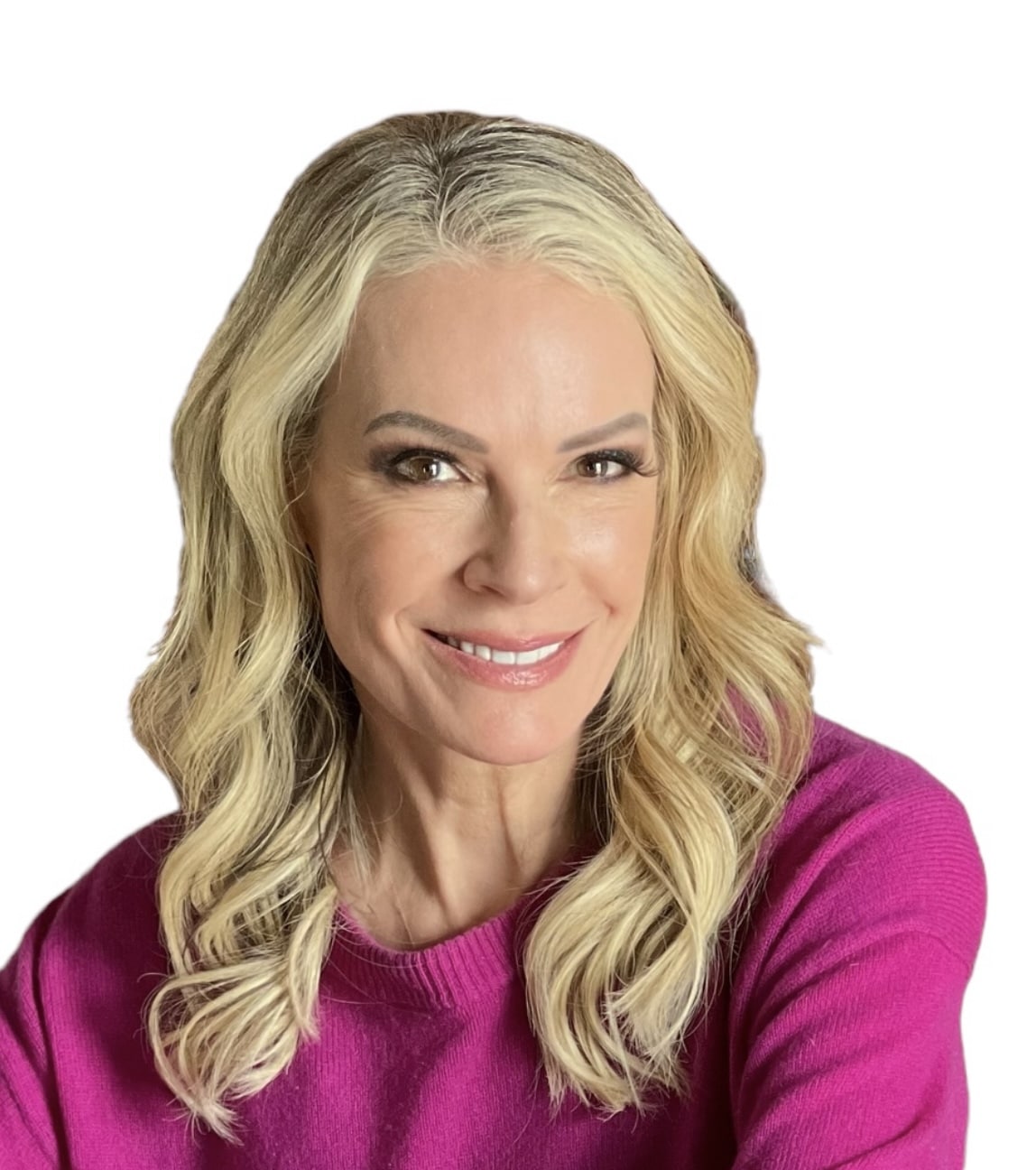
Dr. Nina Savelle-Rocklin is a psychoanalyst, author and radio host specializing in binge eating disorder. She is the author of The Binge Cure: 7 Steps to Outsmart Emotional Eating and Food for Thought: Perspectives on Eating Disorders, and co-editor of Beyond the Primal Addiction. She hosts The Dr. Nina Show radio program on LA Talk Radio.
More episodes

